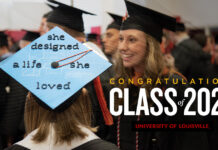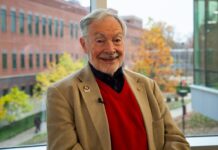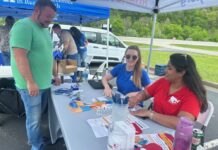The School of Interdisciplinary and Graduate Studies gave Ocker the Alice Eaves Barns Award Dec. 16 in recognition of his tenacity in the face of adversity. Here’s his story, in the words of his nominator, sport administration professor Mary Hums.
To the Members of the Committee:
I am writing this letter of nomination for the Alice Eaves Barnes Award for Mr. Brent Ocker. Brent will be graduating with his Master of Science in sport administration. To say he has overcome adversity in pursuit of his degree is truly an understatement.
On 10 September 2010, Brent came back to his apartment and told his roommates he did not feel well. They went to the doctor, who treated him for what was observed, which appeared to be dizziness and vertigo. However, a bit later, Brent came to the realization that he was now becoming extremely ill. He literally crawled down the hall to wake one of his roommates to ask to be taken to the hospital, and was admitted to Baptist East Hospital ICU on 11 September 2010.
Upon arriving at the hospital, his condition rapidly deteriorated. His body systems were beginning to shut down, and slowly, paralysis was setting in. The doctors worked feverishly to try and diagnose what was going on. Brent was literally fighting for his life. Finally, one of the doctors determined that Brent was suffering from botulism, which strikes only about 20 people per year in the United States. An emergency request was made for the antidote to be flown up from the CDC in Atlanta. This antidote is administered in the form of a shot. The patient gets one shot of the antidote, and it either works and there is hope for recovery, or it does not, and the patient will not survive. The antidote itself is potentially fatal 25 percent of the time, but is the only possible action to take to save the patient. Brent’s family members from around the country were now arriving to be with him, and a number of his fellow sport administration student friends were by his side as well, as lay Brent unconscious and unable to move. People who learned of Brent’s situation paused to pray, wherever they were.
In the days that passed, signs slowly indicated that the antidote was taking effect, although there were setbacks along the way. One major issue was weaning Brent off the ventilator. As his muscles had been temporarily paralyzed, he had to retrain the muscles he used to breathe to work again, and for a while, taking a simple breath was a struggle. It became apparent that his recovery was going to take time and hard work. He also had a trach tube inserted on 15 September (his birthday), which he used for almost 60 days. He was unable to eat, drink or speak for 52 days. He battled pneumonia three times and also a staph infection. He communicated by using a pad of paper which someone would place under his hand and move for him as he used the limited movement ability he had for his hand to write, even though he could not look to see what he had written. I remember the initial day I visited him and the first thing he wrote on his paper was, “Hi Dr. Hums.”
Over the weeks and months, Brent made progress, winning small victories like being able to breathe, eat, sit up and, eventually, stand up on his own. After some weeks, he was transferred from the hospital into rehab, where the hard, frustrating work continued – learning to walk again, climb the stairs and all those other little things able-bodied people never give a second thought to. His family members and friends never wavered in their support. All in all, his total hospital stay was 66 days (16 Baptist East ICU, 30 Kindred Hospital, 20 Frazier Rehab). His father was there the first night and did not leave for 52 days. His mother quit her job to relocate to Louisville to care for Brent once his dad returned to work.
I remember the day I heard the news, “Brent is going home.” I remember even more the day he walked into my office in December 2010 and we sat down and wrote out his class schedule for Spring 2011. In over 30 years of teaching, I don’t think I ever hugged a student so tightly and cried so many tears of joy.
This letter really does not do justice to Brent’s story of strength and triumph and his continuing recovery. He is an inspiration to so many of us. He is currently working as an intern at the KFCYum! Center and he will earn his graduate degree this December. When I think of Brent’s story, I think of the now famous line the TV announcer said back during the 1980 Olympic Games when the USA hockey team defeated the Soviet Union – “Do you believe in miracles?” Yes, I do.

























